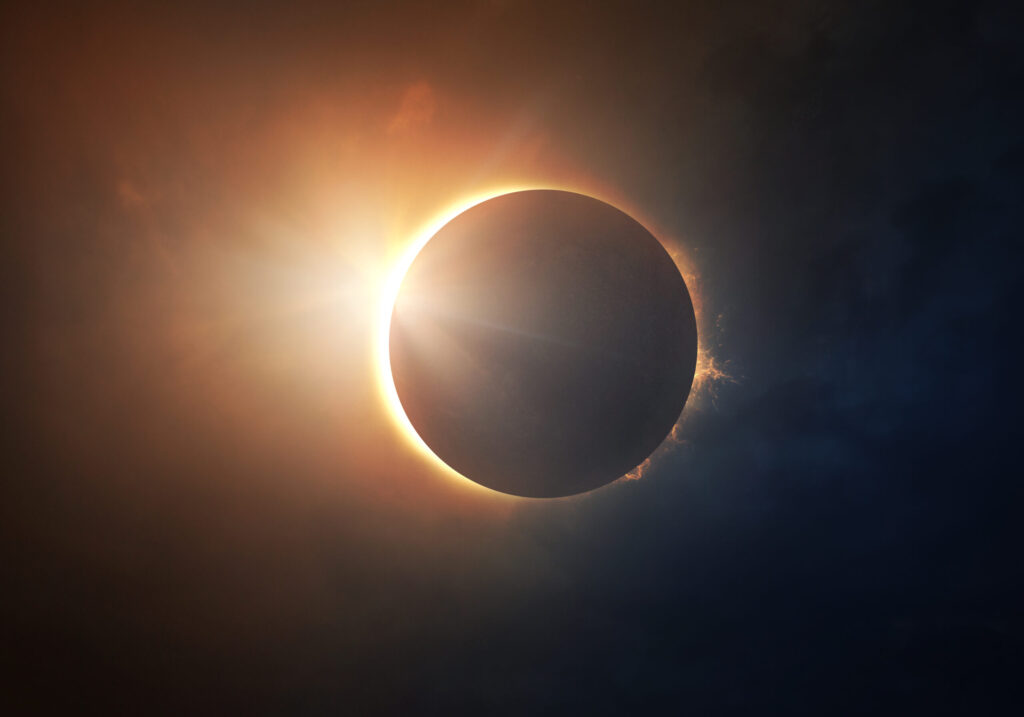Note: If you wish to receive, via e-mail, (1) my weekly newsletter or (2) daily copies of these posts, write to me at rrbates1951@gmail.com. Comments may also be sent to this address. I promise not to share your e-mail with anyone. To unsubscribe, write here as well.
Monday
I’ve come across two solar eclipse poems to prepare you for today’s great celestial event. In Ella Wheeler Wilcox’s sensuous sonnet, the moon is the earth’s ever-faithful lover who “shines ever on her lover as they run/ And lights his orbit with her silvery smile.”
And every so often, as on April 8, 2024, she “softly slips,/ And with her mantle veils the Sun’s bold eyes.” While we below “see only that the Sun is in eclipse,” the moon is stealing a kiss:
A Solar Eclipse
By Ella Wheeler Wilcox
In that great journey of the stars through space
About the mighty, all-directing Sun,
The pallid, faithful Moon, has been the one
Companion of the Earth. Her tender face,
Pale with the swift, keen purpose of that race,
Which at Time’s natal hour was first begun,
Shines ever on her lover as they run
And lights his orbit with her silvery smile.Sometimes such passionate love doth in her rise,
Down from her beaten path she softly slips,
And with her mantle veils the Sun’s bold eyes,
Then in the gloaming finds her lover’s lips.
While far and near the men our world call wise
See only that the Sun is in eclipse.
Deborah Trestman’s “The Eclipse” also finds something mystical as “planets/ perfectly align for three long/ minutes, as long as a song.” In this magical moment of “night without sunset,” the birds go quiet and the poet imagines beasts, charmed by the moment, dancing to bells and flute and “forgetting fear and fierceness.” She appears to be referencing celestial harmonies, the music of the spheres, when she says that “gentled bears and lions” are “tamed for the length/ of a chiming whistling tune.”
But the moment passes as “the sun heals white.” In the cold light of day, reality reasserts itself and people become strangers once again. I’m not sure what the poet means by “the crown of the queen of false night”—and how one loses said crown—but it sounds like the magic has gone and, with it, the possibility of a better world. Here’s the poem:
The Eclipse
By Deborah Trestman
Birds nest at midday, chirp night
songs in midday twilight –night
without sunset, the sun noon
high, bruised black by the moon.Charmed beasts dance to bells and flute,
forgetting fear and fierceness, gentled
bears and lions tamed for the length
of a chiming whistling tune.
Strangers fall in love; a prince
and a princess, parrots. Planets
perfectly align for three long
minutes, as long as a song,
until the sun heals white. Costumed
parrots mock the wounds of magic.
Strangers once more have lost
the crown of the queen of false night.
Past posts on the August 2017 Eclipse
Twain and Tintin on Eclipses
Coleridge on Celestial Bodies


